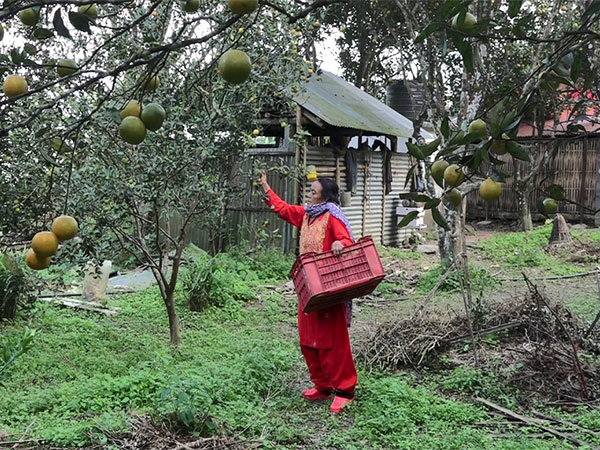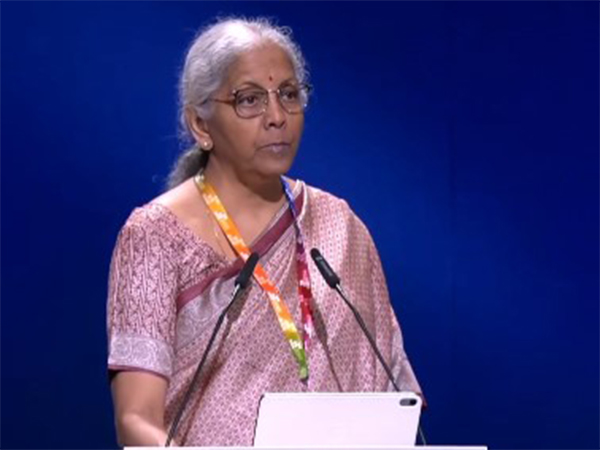By Binod Prasad Adhikari
Sindhuli [Nepal], January 19 (ANI): The once-thriving sweet orange industry in Nepal’s Sindhuli district is facing an unprecedented crisis due to rising temperatures and the spread of citrus greening disease.
The disease, which has already affected over 80 per cent of the district’s sweet orange trees, has left farmers like Bal Kumari Thapa struggling to make ends meet.
The sale of citrus fruits brought cash to her home but the source has now dried up since half-a-decade as she had to set her entire orchard on fire. Her orchard which once hosted 2,500 trees had to be entirely burnt down with the outbreak citrus greening epidemic, a vector-borne disease that engulfs an area without any warning signs.
The sweet orange industry is a significant contributor to Nepal’s economy, with the Sindhuli district alone producing over 9,000 metric tons of sweet oranges annually. However, the rising temperatures and changing climatic patterns have made it difficult for farmers to cultivate the fruit.
“This tree was planted in 2006 and it bore fruit from 2007. After about two years, we started selling fruits to the market. The tree bore around 500 fruits per season. In 2009 the tree got infected. I used to cover the roots of the tree with the cow dung and water it. But now only the hinge of the trees in my orchard,” Bal Kumari Thapa recalled her memories as she stood next to the charred remains of a tree that once stood in her lush green orchard.
“I miss the Junar (sweet oranges) very much. My orchard has expanded over 18 Ropani (98,568 square feet). The trees were bearing fruits. We sold the fruits that were produced for the first cycle but in the second cycle, the trees died. The contagion affected the tree at the beginning of the harvest season. The topmost leaves of the tree started to yellow and quickly reached the root. Now we use the tree as firewood,” Thapa recalls.
“Officials who came for the inspection informed us that citrus greening is responsible for the situation. Our field got attacked by a pest when we were about to start earning from it,” she sighed.
The Huanglonging, also known as citrus greening is a devastating disease that infects citrus orchards. It has three species of un-culturable and phloem-limited bacteria out of which the most commonly found in Nepal is Candidatus Liberibacter asiaticus which is transmitted by an insect vector.
Thapa’s orchard also got infected by the same contagion that hit several economically important citrus production areas of Nepal. Its cure is yet to be known.
“When my orchards were green and lush, I used to weed out, use fertilizers and water it. A sense of passion gave me the boost to do more. But now, my beloved orchard is lost.”
The Nepal government has launched initiatives to promote alternative crops and provide support to affected farmers. However, the transition is not easy, and many farmers are struggling to adapt to the new reality.
“This contagion is a recent one. We started noticing it about 7 years back. I suspect it to have been carried here Ramechhap,” Devi Kumari Thakuri, a 68-year-old farmer who has been cultivating Junar since a young age, told ANI.
Thakuri claims that the orchard yielding became instrumental in raising her children, sending them abroad, as well as marrying them off. Whenever someone visits her orchard, she proudly shows her oldest sweet lime tree, which is around 43 years old. Though it still bears fruits, there are changes in their size.
Thakuri suspects the contagion was carried onto Sindhuli district by a local resident who happened to bring infected citrus fruits that adapted to the climatic situation and engulfed the whole region.
“Officials have provided us with a bag to collect the damaged fruits. I also have collected some larva which are kept in a bucket filled half with mud and covered by cotton cloth with mouth tightened so that it doesn’t escape. They will die in a few days, we don’t have any other option than that to save our produce,” the 68-year-old farmer stated.
Earlier, the horticulture experts who inspected the area suggested they bury the infected fruits. But later, it was discovered that burying itself became one of the reasons behind the exponential outburst of the contagion as it survived beneath the soil, further corrupting productivity.
“Previously we used to dig a pit and bury the infected fruits. Then it would slip to the lower grounds and spread further. The fruits need to be packed in the plastic and kept isolated. The packet’s neck is tightened and kept aside for about a week which kills the pest,” Thakuri explained the technique.
Bal Kumari was told by the government officials that climate change was responsible for slowly fueling the contagion. The burning down of the orchard caused a loss of about Nepali Rupees (NRs) 10 million.
“Because of the climate change, the plants started blooming flowers at normal times as well as in off-seasons. At first we thought it would mutate and would give fruits round the year. We plucked out the off-season flowers and dumped it but some of the fellow farmers kept it. Turns out that the fruits didn’t ripe season as well, some of them were half-ripe, the cover of the fruit started thickening. The irregular rain pattern also fueled it,” Thapa recalls.
“Climate change has resulted either in delay or early blooming time of fruit flowers. In some cases, it blooms throughout the year, yielding low quality fruits. This unusual trend has increased worries and trouble for the farmers,” Krishna Prasad Pokhrel, the local government representative of the Golanjor municipality, told ANI.
First recorded in 1968, the Himalayan nation’s first case of Citrus greening near Pokhara has since been recorded in many areas of the nation, threatening the orchards.
Nepal, home to 8 out of the 10 highest mountains in the world, has recorded a steep rise in temperature between 0.3-0.7°C faster than the global average.
“In recent times, climate change has depleted the production of sweet oranges. Contagion has increased over time, shifted the ripening of fruits, and reduced their quality,” local agriculture officer Hridaya Raj Thapa stated.
Sweet oranges have a distinctive sweet taste and are rich in Vitamin C and minerals. Considered to be a special fruit of Nepal due to its rarity in other countries, Junar has established the identity of Sindhuli district as its mainland.
On average, the farmers earned about Nrs 500 million last year from sweet orange crops. Out of the total production of 8,881 tonnes last year, 7,500 tonnes were shipped out of the district. Sweet oranges appear in the market from mid-November to mid-February. Green sweet oranges are also sold during the festive season.
Despite the increasing damage by the contagion, Nepali agricultural experts are not able to find the exact reason and origin of the pest in the district. Instead, they have recorded the presence of pests in higher altitudes which they attribute to possible factors of climate change.
“Untimed rainfall along with hailstone and drought has been damaging the orchards. The issue of citrus greening has increased in recent days in comparison to before. When we make a comparative study that is carried out in other countries and our observation of the pathogen that is responsible for citrus greening- the citrus shellac earlier used to be found on orchards at elevation of 800 we found it above 1,000 meters. In Sindhuli, we detected the vector insect at an altitude of 1,045 meters. This shows that warm temperatures has created favorable conditions and the contagion has started increasing. In my personal observation, it was found at an elevation of 1,100 meters in Khotang District as well, at an elevation of 1,250 meters,” Dev Raj Adhikari, Crop Protection Officer told ANI.
The story of Thapa and other farmers in Sindhuli district is a testament to the devastating impact of climate change on agriculture and rural communities. As the world grapples with the challenges of climate change, it is essential to support and empower farmers like Thapa to adapt and thrive in a changing environment.
Based on the observation and prevailing facts, the government has decided to stop encouraging the farmers to cultivate sweet orange in altitudes of 800 to 999 meters, deeming it to be prone to pathogens. Apart from climate change, the expert opines that citrus greening is the result of disruption in the food chain of the ecosystem.
“Areas that lie below 1,000 meters, we are slowing our pace to promote the Junar cultivation and production. We had been working on expanding it in the areas above 1,000 meters. We are replacing Junar nursery and orchards with other agricultural products,” Humagain added.
The unfit trees include ones from the older generation which are slowly being replaced with new saplings. The DADO annually has been running a plantation campaign of planting 18,000 new saplings with an aim to replace the older ones by the year 2032.
However, this new plantation campaign only focuses on the lands that lie at an elevation higher than 1,000 meters provided the rising temperature and probability of the contagion epidemic.
“We cannot leave agriculture as we have nowhere to go and no other business we know to do. As we have been suggested not to cultivate sweet oranges immediately, I’ve cultivated potatoes in this field, turmeric, ginger and avocado along with lemon and guava so that I can have more income.” Bal Kumari concludes. (ANI)
Disclaimer: This story is auto-generated from a syndicated feed of ANI; only the image & headline may have been reworked by News Services Division of World News Network Inc Ltd and Palghar News and Pune News and World News
HINDI, MARATHI, GUJARATI, TAMIL, TELUGU, BENGALI, KANNADA, ORIYA, PUNJABI, URDU, MALAYALAM
For more details and packages
















